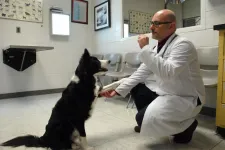MRI helps unravel the mysteries of sleep
2021-01-22
(Press-News.org) Our state of consciousness changes significantly during stages of deep sleep, just as it does in a coma or under general anesthesia. Scientists have long believed - but couldn't be certain - that brain activity declines when we sleep. Most research on sleep is conducted using electroencephalography (EEG), a method that entails measuring brain activity through electrodes placed along a patient's scalp. However, Anjali Tarun, a doctoral assistant at EPFL's Medical Image Processing Laboratory within the School of Engineering, decided to investigate brain activity during sleep using magnetic resonance imaging, or MRI. According to Dimitri Van De Ville, who heads the lab, "MRI scans measure neural activity by detecting the hemodynamic response of structures throughout the brain, thereby providing important information in addition to EEGs." During these experiments, Tarun relied upon EEG to identify when the study participants had fallen asleep and pinpoint the different stages of sleep. Then she examined the MRI images to generate spatial maps of neural activity and determine different brain states.
Difficult data to obtain
The only catch was that it wasn't easy to perform brain MRIs on participants while they were sleeping. The machines are very noisy, making it hard for participants to reach a state of deep sleep. But working with Prof. Sophie Schwartz at the University of Geneva and Prof. Nikolai Axmacher at Ruhr-Universität Bochum, Tarun could leverage simultaneous MRI and EEG data from around thirty people. The brain-activity data were covered a period of nearly two hours while participants were sleeping in an MRI machine. "Two hours is a relatively long time, meaning we were able to obtain a set of rare, reliable data," says Tarun. "MRIs carried out while a patient is performing a cognitive task usually last around 10-30 minutes."
Brain activity during sleep
After checking, analyzing and comparing all the data, what Tarun found was surprising. "We calculated exactly how many times networks made up of different parts of the brain became active during each stage of sleep," she says. "We discovered that during light stages of sleep - that is, between when you fall asleep and when you enter a state of deep sleep - overall brain activity decreases. But communication among different parts of the brain becomes much more dynamic. We think that's due to the instability of brain states during this phase." Van De Ville adds: "What really surprised us in all this was the resulting paradox. During the transition phase from light to deep sleep, local brain activity increased and mutual interaction decreased. This indicates the inability of brain networks to synchronize."
The role of default-mode networks and the cerebellum
Consciousness is generally associated with neural networks that may be linked to our introspection processes, episodic memory and spontaneous thought. "We saw that the network between the anterior and posterior regions broke down, and this became increasingly pronounced with increasing sleep depth," says Van De Ville. "A similar breakdown in neural networks was also observed in the cerebellum, which is typically associated with motor control." For now, the scientists don't know exactly why this happens. But their findings are a first step towards a better understanding of our state of consciousness while we sleep. "Our findings show that consciousness is the result of interactions between different brain regions, and not in localized brain activity," says Tarun. "By studying how our state of consciousness is altered during different stages of sleep, and what that means in terms of brain network activity, we can better understand and account for the wide range of brain functions that characterize us as human beings."
INFORMATION:
ELSE PRESS RELEASES FROM THIS DATE:
2021-01-22
In a promising result for the success of vaccines against COVID-19, rhesus macaque monkeys infected with the human coronavirus SARS-CoV-2 developed protective immune responses that might be reproduced with a vaccine. The work was carried out at the California National Primate Research Center at the University of California, Davis and is published Jan. 22 in the journal Nature Communications.
"These results suggest that vaccines inducing durable protective immunity against SARS-CoV-2 do so by stimulating robust germinal center responses - a question that can be effectively answered ...
2021-01-22
Scientists from the International Centre for Radio Astronomy Research (ICRAR) and The University of Western Australia (UWA) have set a world record for the most stable transmission of a laser signal through the atmosphere.
In a study published today in the journal Nature Communications, Australian researchers teamed up with researchers from the French National Centre for Space Studies (CNES) and the French metrology lab Systèmes de Référence Temps-Espace (SYRTE) at Paris Observatory.
The team set the world record for the most stable laser transmission by combining the Aussies' 'phase stabilisation' technology with advanced self-guiding optical ...
2021-01-22
New research has found that growing up in a bilingual home can provide unexpected cognitive benefits later in life.
The study, published in the journal Scientific Reports, demonstrates for the first time that adults who acquired their second language as a young child (early bilinguals) are quicker at shifting attention and quicker at detecting visual changes compared to adults who learnt their second language later in life (late bilinguals).
Led by Dr Dean D'Souza of Anglia Ruskin University (ARU), the research saw 127 adults take part in two separate ...
2021-01-22
There is a saying that you can't teach old dogs new tricks. When it comes to canine behavioral problems, age is only one factor that can predict how well a pet may respond to clinical intervention. In a paper published in Frontiers in Veterinary Science, researchers provide the first evidence on the importance of not just a dog's age, sex and size on treatment success, but the owner's personality and the kind of bond that human and animal share.
The study analyzed the physiological and psychological characteristics of 131 dog-owner pairs who attended a veterinary behavioral service over a six-month period. The statistical results were based on a behavioral assessment questionnaire that was given at the beginning, middle and end of the ...
2021-01-22
A new collaborative study led by researchers at the National Institute for Environmental Studies, the University of Tokyo, and Michigan State University exposes the role of dams for mitigating flood risk under climate change.
Flood is amongst the costliest natural disasters. Globally, flood risk is projected to increase in the future, driven by climate change and population growth. The role of dams in flood mitigation, previously unaccounted for, was found to decrease by approximately 15% the number of people globally exposed to historical once-in-100-year ...
2021-01-22
Questions about why such affluent western societies are facing a reversal in life expectancy are sounding loud alarm bells for Professor Fran Baum, Matthew Flinders Distinguished Professor and Director of the Southgate Institute for Health, Society and Equity.
Professor Baum is lead author of a study that offers a new perspective on why women live longer than men - noting with concern that while women live longer, many of the recognised social determinants of health are worse for women than men.
The study serves an important reminder of why policy makers need to receive more carefully nuanced research that drills into specific gender data that can best inform public health policy initiatives.
"We need gendered analysis to shape ...
2021-01-22
During a pandemic, decisions have to be made under time pressure and amid scientific uncertainty, with potential disagreements among experts and models. With COVID-19, especially during the first wave, there was uncertainty about the virus transmissibility, the disease severity, the future evolution of the pandemic and the effectiveness of the proposed policy interventions, such as wearing face masks or closing schools. Together with a group of epidemiologists and economists, including the Nobel Prize winner Lars Peter Hansen, Bocconi professors Massimo Marinacci, AXA-Bocconi Chair in Risk, and Valentina Bosetti investigated how modern decision theory can help policymakers ...
2021-01-22
Loneliness in adults aged 50 and over during the COVID-19 lockdown was linked to worsening depressive and other mental health symptoms, according to a large-scale online study.
Loneliness emerged as a key factor linked to worsening symptoms of depression and anxiety in a study of more than 3,000 people aged 50 or over led by the University of Exeter and King's College London, and funded by The National Institute for Health Research (NIHR) Maudsley Biomedical Research Centre (BRC) .
Researchers had access to data going back to 2015 for participants of the ...
2021-01-22
Researchers from Nanyang Technological University (Singapore), Shanghai Jiao Tong University, and University of Hong Kong published a new paper in the Journal of Marketing that examines why and how charitable organizations can increase donations by soliciting consumers after retailers' price promotions.
The study, forthcoming in the Journal of Marketing, is titled "Do Promotions Make Consumers More Generous? The Impact of Price Promotions on Consumers' Donation Behavior" and is authored by Kuangjie Zhang, Fengyan Cai, and Zhengyu Shi.
Giving Tuesday, a global generosity movement, takes place each year on the Tuesday after US Thanksgiving (immediately after Black Friday and Cyber Monday sales). Charitable donations generally see a big boost on Giving Tuesday. This year, American consumers ...
2021-01-22
The Ganges River - with the combined flows of the Brahmaputra and Meghna rivers - could be responsible for up to 3 billion microplastic particles entering the Bay of Bengal every day, according to new research.
The study represents the first investigation of microplastic abundance, characteristics and seasonal variation along the river and was conducted using samples collected by an international team of scientists as part of the National Geographic Society's END ...
LAST 30 PRESS RELEASES:
[Press-News.org] MRI helps unravel the mysteries of sleep



